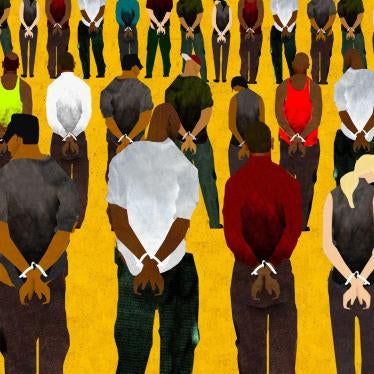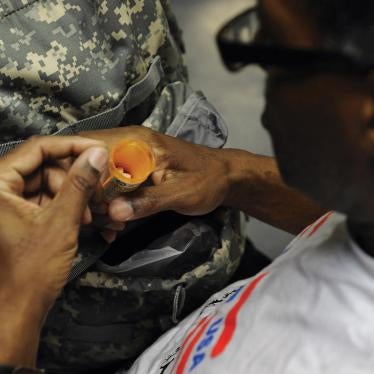Of the many issues that national politicians routinely gloss over during campaign season, one they’re least likely to touch—and haven’t, in any real way, since the 1980s—is drug policy. A discussion of the costs and benefits of our current policies is largely anathema in our political environment.
But the country ignores the issue at its own peril.
Within the United States, the so called “drug war” has been a significant factor propelling the growth of our grossly outsized prison population—with many people serving lengthy sentences for relatively minor crimes. As my colleague at Human Rights Watch, Jamie Fellner, has noted in The Huffington Post, the United States has spent hundreds of billions of dollars to arrest and incarcerate drug offenders, including millions whose crime was possession of marijuana.
Of those in prison, a vastly disproportionate number are people of color. Human Rights Watch has documented extensively stunning and persistent racial disparities in both arrest and incarceration of drug offenders. Black and white people commit drug offenses at similar rates, but black men are ten times as likely as white men to enter state prisons on drug charges. The impact on the broader black community is devastating.
Meanwhile, organized crime and armed groups that have for decades terrorized people in distant places like Colombia or Guatemala continue to operate, fueled by seemingly limitless cash flows from the illicit drug market. The United States has poured millions of dollars into foreign militaries to stem the flow of drugs, but the criminal groups continue to wield enormous power to corrupt and intimidate—and to kill; while those foreign militaries are often responsible for serious human rights violations. Sometimes they work together.
In Colombia, for example, which U.S. officials like to trot out as a success story, nearly a third of the Congress has come under investigation in recent years for working with drug-running paramilitary mafias. Armed groups continue to displace tens of thousands of Colombians every year. In Mexico, with the vast ramping up of the drug war over the last six years, personal security has plummeted and the homicide rate has exploded, with more than 60,000 drug-related killings since 2007. The Mexican government attributes many of those killings to the drug cartels, which routinely engage in public displays of violence, such as hanging mutilated bodies from overpasses, to sow terror. But the security forces themselves—which have received substantial U.S. funding—have also engaged in widespread abuses, including torture, enforced disappearances and extrajudicial executions, as Human Rights Watch recently documented.
Similar issues crop up in other parts of the world where the United States has important security interests, including Afghanistan, where warlords and armed groups, including the Taliban, also reap huge profits from illegal drugs.
The Obama administration has, in a mild way, changed some of the rhetoric around drugs. And recent legislative changes to reduce federal sentencing disparities between different types of cocaine offenses (which had contributed to racial disparities) have been a positive step.
Other governments and world leaders have recently been talking more openly about the costs, including in human rights terms, of the current paradigm. In fact, it is the presidents of Colombia, Mexico, and Guatemala—countries bearing many of the worst costs of drug policy—who have been calling for a debate about decriminalization or legalization of cocaine. Brazil is looking into decriminalizing personal use of drugs. Uruguay, where personal use has never been criminalized, is moving toward some form of legalization and regulation of the sale of marijuana.
The Global Commission on Drug Policy, made up of several former Latin American presidents and such notables as former U.S. Secretary of State George Schultz and former EU High Representative Javier Solana, has also called for “break[ing] the taboo,” and encouraged governments to experiment with alternative approaches to drugs. Not everyone agrees on the right way to go on drug policy, but at least some leaders and governments are having an open discussion about it. Whether a different set of policies would better serve human rights and U.S. interests is something that U.S. policymakers may genuinely disagree about. But a rigorous debate within the United States about drug policy and its financial and human rights consequences is long overdue. The country should start now.
Maria McFarland Sanchez-Moreno is acting U.S. program director at Human Rights Watch.





